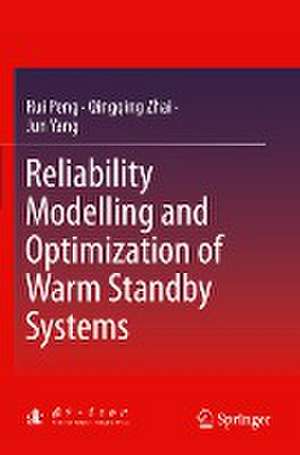Reliability Modelling and Optimization of Warm Standby Systems
Autor Rui Peng, Qingqing Zhai, Jun Yang Traducere de Heping Jiaen Limba Engleză Paperback – 3 mai 2022
| Toate formatele și edițiile | Preț | Express |
|---|---|---|
| Paperback (1) | 634.68 lei 6-8 săpt. | |
| Springer Nature Singapore – 3 mai 2022 | 634.68 lei 6-8 săpt. | |
| Hardback (1) | 640.88 lei 6-8 săpt. | |
| Springer Nature Singapore – 3 mai 2021 | 640.88 lei 6-8 săpt. |
Preț: 634.68 lei
Preț vechi: 746.69 lei
-15% Nou
Puncte Express: 952
Preț estimativ în valută:
121.45€ • 129.87$ • 101.26£
121.45€ • 129.87$ • 101.26£
Carte tipărită la comandă
Livrare economică 18 aprilie-02 mai
Preluare comenzi: 021 569.72.76
Specificații
ISBN-13: 9789811617942
ISBN-10: 9811617945
Ilustrații: XII, 166 p. 76 illus., 20 illus. in color.
Dimensiuni: 155 x 235 mm
Greutate: 0.26 kg
Ediția:1st ed. 2021
Editura: Springer Nature Singapore
Colecția Springer
Locul publicării:Singapore, Singapore
ISBN-10: 9811617945
Ilustrații: XII, 166 p. 76 illus., 20 illus. in color.
Dimensiuni: 155 x 235 mm
Greutate: 0.26 kg
Ediția:1st ed. 2021
Editura: Springer Nature Singapore
Colecția Springer
Locul publicării:Singapore, Singapore
Cuprins
Introduction.- Related concepts in reliability modeling of warm standby systems.- Reliability of -out-of- warm standby systems.- Reliability of demand-based warm standby systems.- Reliability of warm standby systems with imperfect fault coverage and switching failure.- Optimal working sequence in a 1-out-of-n warm standby system.- Reliability Evaluation for Demand-based Warm Standby Systems Considering Degradation Process.- Reliability of demand-based warm standby system with common bus performance sharing.- Reliability of Warm Standby Systems with Phased-Mission Requirement.- Reliability of warm standby systems with complex structure.
Notă biografică
Rui PENG is a Ph.D supervisor in School of Economics & Management, Beijing University of Technology. His research interests include system reliability, maintenance and defence. He has published more than 90 SCI-indexed journal papers in renowned journals, such as IIE Transactions, IEEE Transactions on Reliability, Reliability Engineering & System Safety. He is an IEEE senior member, an editorial board member of Reliability Engineering & System Safety, a highly cited Chinese Scholar recognized by Elsevier, and selected into the Beijing Nova Program of Science & Technology.
Qingqing Zhai is an Assistant Professor in School of Management, Shanghai University. His research interests include system reliability modeling and residual life estimation. He has published more than 20 journal papers in renowned journals such as Risk Analysis, European Journal of Operational Research, etc.
Jun Yang is a professor in School of Reliability and System Engineering, Beihang University. His research interests include system reliability, system residual life estimation and system maintenance. He has published more than 60 journal papers and led quite a few NSFC projects.
Qingqing Zhai is an Assistant Professor in School of Management, Shanghai University. His research interests include system reliability modeling and residual life estimation. He has published more than 20 journal papers in renowned journals such as Risk Analysis, European Journal of Operational Research, etc.
Jun Yang is a professor in School of Reliability and System Engineering, Beihang University. His research interests include system reliability, system residual life estimation and system maintenance. He has published more than 60 journal papers and led quite a few NSFC projects.
Textul de pe ultima copertă
This book introduces the reliability modelling and optimization of warm standby systems. Warm standby is an attractive redundancy technique, as it consumes less energy than hot standby and switches into the active state faster than cold standby. Since a warm standby component experiences different failure rates in the standby state and active state, the reliability evaluation is challenging and the existing works are only restricted to very special cases. By adapting the decision diagrams, this book proposes the methodology to evaluate the reliability of different types of warm standby systems and studies the reliability optimization. Compared with existing works, the proposed methods allow the system to have an arbitrary number of components and allow the failure time distribution of components to observe arbitrary distributions. From this book, the readers can not only learn how to evaluate and optimize the reliability of warm standby systems but also use the methods to study the reliability of other complex systems.
Caracteristici
Is the first book available on reliability of general warm standby systems Studies both reliability evaluation and optimization Studies influences of different factors, such as imperfect fault coverage, phased mission requirements, switch failure
